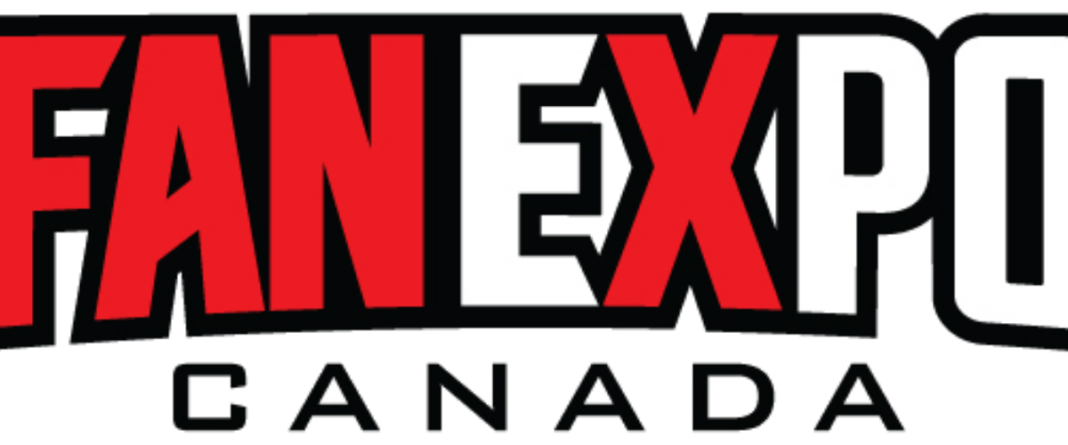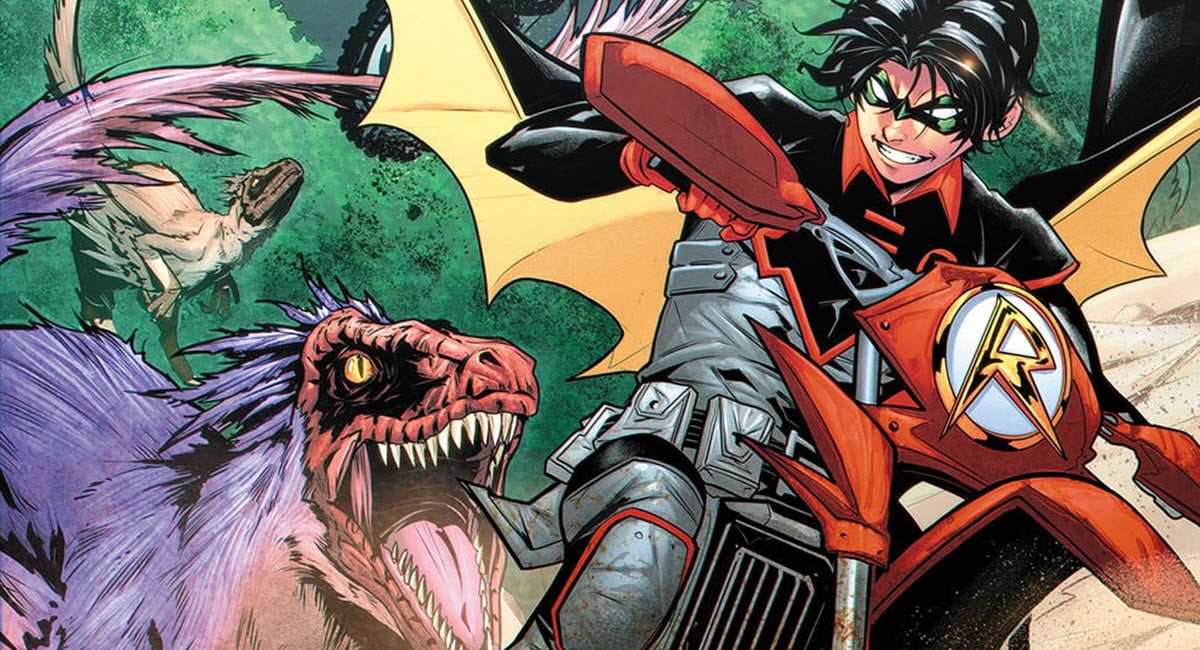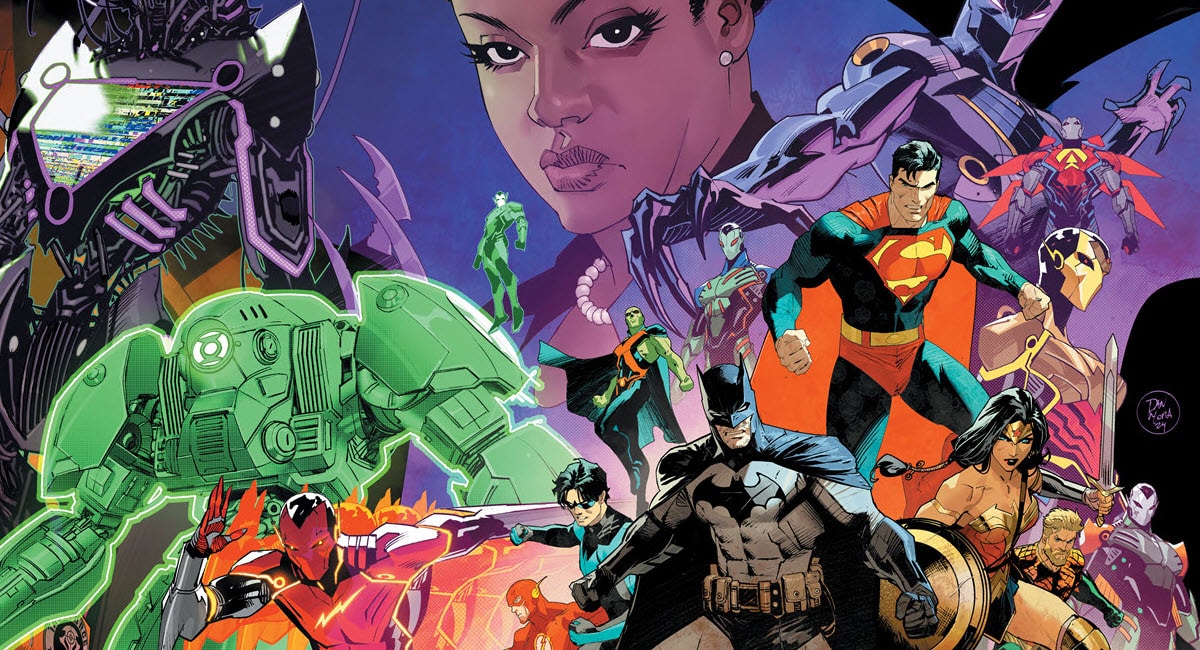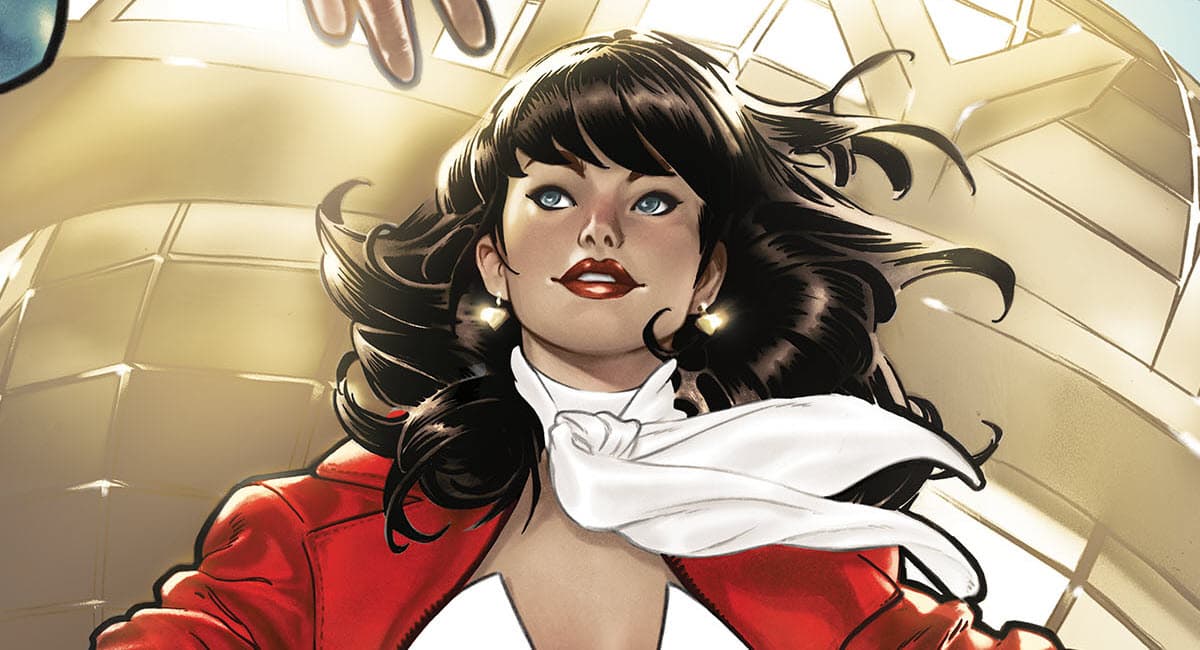A lot of people think they can just pick up a pen, or rather put fingers to keyboard, and expect to get everything right when it comes to writing. There’s a little bit more to it than that, and that can end up discouraging a lot of people. Writing, like most skills, is a discipline and requires a lot of hard work to get it right. Keep going, don’t get discouraged, and understand that it’s a hard journey. The Writing for Comics panel that I attended at Fan Expo Canada this past Friday told me as much.
The panel involved Ed Brisson (Dead Man Logan, New Mutants), Matthew Rosenberg (Uncanny X-Men, The Punisher), Jim Zub (Champions), and Meredith Finch (Wonder Woman). The panel was moderated by John Kirk of Pop Mythology.
Kirk began by saying that he didn’t really need to be there at all, and wanted to let the panelists do the talking while he sat back and provided white noise. He asked the panel about how they got their starts in comics.
Finch got into comics when she first met her husband, artist David Finch, who she mentions has been to every Fan Expo since it started. This year is the 25th anniversary of the show which is why she mentioned it. When they first met she didn’t realise that comics were published as we knew them, she thought David drew comic strips like you find in newspapers. At the end of the date, he showed her some comics he had in his trunk and gave her a copy of “Avengers Disassembled.” That move got her into reading comics and she swiftly fell in love with them, eventually leading her to write her own stuff.
Zub notes his date with David didn’t end with him giving him comics from his trunk, which garnered laughs from the panel and the audience. He jokes that he was hurt by that and he wanted more while David wasn’t ready. Zub worked in animation back then and still does some work in the industry. As a side note, Zub teaches animation in Seneca College, which is adjacent to the university that this humble writer attends.
When he worked in animation, he was doing grunt work. He describes himself as a cog in the machine and didn’t have any creative control, in that he had story ideas but had nowhere to put them. After his day job he would go home and draw webcomics and comic strips. This was during the late 90s and he understood basic HTML, which is how he was able to post his work. Creators like Ryan North and Scott Kurtz also did webcomics, and they were a part of a group of webcomic creators who had Scott McCloud offer them advice and such.
McCloud convinced Zub to go to San Diego Comic Con in 2002, where he crashed on the floor of a hotel room. It took years for him to gain traction. He started publishing Skull Kickers in 2009, which was his love letter to fantasy and Conan the Barbarian. Now he’s writing Conan at Marvel, and notes that he’s writing the things he grew up loving.
Rosenberg says that he didn’t do webcomics, but did briefly date David Finch. He worked in the music industry which he says is a horrible industry. Everyone he knew in the industry said they didn’t listen to music anymore, and he thought the same way. The only thing he didn’t hate was comics. So, he quit his job to try and figure out how to make comics. He pitched to a lot of artists that he met online and offered them money. Some of his comics looked awesome, but some of them looked terrible because those particular artists couldn’t draw. Some artists vanished with his money because they weren’t artists. He pitched to various anthologies, and even pitched to a Skull Kickers anthology contest by Zub and didn’t win.
In a turn of events, the Wu Tang Clan approached him and wanted him to write a comic for them. They had read his comics and that lead to him writing some more short stories and then eventually 4 Kids Walk into a Bank. He was then hired by Marvel.
It was 1994, and Brisson wanted to be an artist. He lived in British Columbia and the internet wasn’t was it is today. He met two writers at a comic book store who were both untalented and “super jerks.” They thought they were the idea men, that comics were all about the writer. They treated artists like conduits to a story instead of the collaborators they really are. He started writing because he didn’t want to work for people like that.
Zub chimes in and says that spite is a powerful motivator.
From 1994 to 2010, Brisson wrote, drew, coloured, and lettered hundreds and hundreds of webcomics, ashcans, and zines. He went to a fine arts school to learn how to be a better artist which didn’t end up working. He ended up working at a print shop and learned about print production. His big break was in 2006 when he began lettering manga. He did books with BOOM!, Oni, and Image and finally started focusing on writing in 2010. He teamed up with a bunch of artists and put out books like Murder Book, which he brought to C2E2 and gave to people as they were leaving the show. One of those people happened to be a Marvel editor, who hired him for Secret Avengers. They didn’t hire him for anything else for two years, and he’s been working there regularly since 2016.
Zub says that if the four of them could make it into comics, with them being somewhere between lucky and incompetent, then anyone can do it.
Kirk asks the panel about their successes, their challenges, and their frustrations.
Zub begins by saying that the market didn’t want a comedy sword and sorcery book in Skull Kickers. It was a stupid decision but he stood behind it. Over time he got well known for those kinds of stories and now fantasy is huge and the stuff that felt like a weakness ended up becoming a strength. Books like The Walking Dead and Bone were nothing like what was available in the market and they ended up being major successes. It’s too much work to chase industry trends, he concludes.
Brisson admits that one problem he had with Secret Avengers was that he was trying to write a Marvel book and not a Brisson book. Zub agrees with that sentiment, that as a writer you have to do something with a story instead of kick the can for another month. Rosenberg says that he was more obsessed with getting published than with making comics. Ultimately there aren’t a lot of editors and publishers and they’re all incredibly busy; they don’t have the time to write anything back and your pitch can sometimes end up in the ether. He never finished comics, he was only writing pages for a pitch. He lost sight of making comics, and realised that you didn’t really need a publisher. Just make comics. He does admit that the industry is almost built to get in the way of that.
Finch says that it’s very easy to lose sight of your writing voice, and that setting yourself up to do a Marvel book means that you might come up with an idea that you’re not passionate about. A writer’s biggest successes are those that come from the heart. Passion tends to be what readers respond to. Zub agrees with Finch, and adds that good editors want to see that passion. He says that your indie comics are a kind of audition. Writing crime books get you books like Punisher, and so goes for cosmic books and other kinds. Rosenberg echoes this, saying that he wrote a book called We Can Never Go Home, which was a story about kids with superpowers. Someone on Twitter said that it was a crappy audition to write the X-Men, which has of course already happened.
Rosenberg used to read interviews with writers he loved like Ed Brubaker and Brian Michael Bendis, who would always get asked about the difference between writing for the Big Two (Marvel and DC) versus writing independent comics. They would always say a variation of it being about totally different skillsets and writing muscles, which Rosenberg thought was a pompous answer. Now, he agrees. It’s the difference between getting in a car with a map versus getting in a car and just driving. Finch adds, it’s the difference between babysitting and taking care of your own children.
Rosenberg talks about 4 Kids Walk into a Bank and the book’s premise. It takes place in the real world but the children’s imagination is a huge part of it. The fourth issue of the series has a scene where the kids go to space and find an overrun space station. The artist, Tyler Boss, was baffled by what Rosenberg was doing to their book. Zub mentions that at the end of the first arc of Wayward, the teen characters were supposed to come together for the first time. He wrote it and hated it, and rewrote the back half. He took a huge chance and killed one of the characters and blew up the building they were in. It was a gamble but it got his artist excited for the future of the series.
Working in creator-owned comics is more gratifying because you don’t have to deal with the burden of legacy, says Brisson. Books can stand on their own and since there are no expectations, you can surprise readers. Zub says that doing crazy stuff at the Big Two will have readers say your work will be undone. Despite that, commercial work can still be fun. You’re tapping into the stuff you read while growing up which is satisfying, and the challenge of figuring out how to make something established new and vibrant is an interesting battle.
At this point, Kirk has opened the floor to audience questions, the first one being the challenge of short stories versus longer arcs. Zub says that it’s valuable early in your career to write, and especially finish, short stories. You need to learn your limits, it’s like buying shoes for a marathon without doing the training. Write scenes that consist of one page, or five, or ten. A few years ago, Zub worked with Bill Rosemann in ad comics that were found in things like cereal boxes. In this you had to have a character’s voice be genuine in less than ten panels and finish it. He did Spider-Man Magazine for two years which consisted of ten-page stories. When we was hired by Marvel and got twenty-page assignments he was happy with the room he had and was able to stretch.
Finch adds that starting a story is much easier because you have a certain degree of enthusiasm for any one project. It’s much harder to finish something. You need to understand your story from beginning to end. Zub says that having a first draft means that someone can critique it. Short stories, Brisson says, offer a sense of completion much faster than writing longer stories. Rosenberg bounces off of this, stating that short stories are more viable.
Anthologies are great for people to break into the industry. It’s where most people will get their starts, not an epic on Batman. After writing for anthologies there really isn’t a place to put your short stories. 2000AD have tons of writers and artists pitching to them all the time. British writers tend to get ideas out on the page super fast as they’re trained differently. He relayed a conversation between him and writer Al Ewing, and of how Ewing described what Rosenberg assumed was a multiple-issue story which turned out to be the first ten pages of his comic.
Another audience member asks a question, about the best way to communicate with an artist about what you want in a scene. Finch states that while one artist will “get” a script, another might not. This is why some writers and artists form teams and stay together for years, because the writer and artist see the page in the same way, usually with the artist making it better. It’s all about chemistry and how the artist is reading what you’ve written. Zub had an artist drawing a book which reviewers were saying was a mess. When the book had a fill-in artist jump on, the same reviewers said they loved the book. Stuff like that is almost out of your control, and Zub wants to know who the artist is of any book he’s doing before he writes the script. They usually talk about their work and his writing, visuals, and the story. He leans into this so they can make an awesome comic together. When you don’t know who an artist is before writing the script, then you don’t know their strengths.
Finch adds that a lot of writing is redoing the dialogue when an artist sends over their pages. Some dialogue might not work, or an artist is doing something than ends up better than you imagined. Rosenberg says that at the end of the day, writers are precious about their script when they shouldn’t be. The script is a conversation with the artist, as the goal is to have a perfect comic and not a perfect script.
The last question of the panel is about who decides on visual storytelling. Zub tells the audience member that they’re looking for a formula when every comic has a different ratio. Every project is different and so is every relationship. Some writers tell their artists to just draw something cool; Brian K. Vaughan tells Fiona Staples to just make things look weird. She doesn’t need to be told what to do but she does it. Rosenberg concludes it by saying that with The Immortal Hulk, Al Ewing is hands-on with designs but artist Joe Bennett goes crazy and changes stuff and makes everything better. It’s all a collaboration. If Bennett did exactly what Ewing wanted then the book would be completely different.
And this concludes the Writing for Comics panel at Fan Expo. There’s a big cheer and loud applause for the panelists, who thank the audience for attending. If you’re interested in check out my write-up of the Breaking into Comics panel at Fan Expo, you can do so here.









Comments are closed.